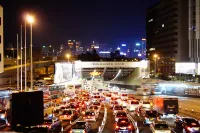Bali is a province of Indonesia, located as the westernmost of the Lesser Sunda Islands, between Java and Lombok. It includes the island of Bali and smaller offshore islands like Nusa Penida. Denpasar is the provincial capital and largest city. Ubud, within Greater Denpasar, is Bali's cultural centre. Tourism is a major economic driver, accounting for 80% of Bali's economy since the 1980s. Bali has become Indonesia's main tourist destination, experiencing a surge in tourism that has led to concerns about overtourism.
1906: Dutch naval and ground assaults at Sanur
In 1906, the Dutch mounted large naval and ground assaults at the Sanur region. Thousands of members of the royal family and their followers committed ritual suicide (puputan) rather than surrender to the Dutch.
1906: Dutch subjugated Bali
In 1906, the Dutch subjugated and repulsed the natives of Bali for economic control.
1932: Release of "Virgins of Bali"
In 1932, the quasi-pornographic documentary "Virgins of Bali" was released. The film, consisting of scenes of topless Balinese women, was a success and a catalyst for Bali's popularity among tourists.
1934: Nudity ban for "civilised" women under Hays code
Up to 1934, the looser version of the Hays code banned nudity involving "civilised" women but permitted it with "uncivilised" women, a loophole exploited by "Virgins of Bali".
1937: Last definite record of a tiger on Bali
The last definite record of a tiger on Bali dates from 1937 when one was shot, though the subspecies may have survived until the 1940s or 1950s.
February 1942: Japanese forces landed near Sanur
In February 1942, Japanese forces landed near the town of Sanur and quickly captured the island of Bali during World War II.
1945: Bali liberated by British forces
In 1945, Bali was liberated by the British 5th infantry Division, who took the Japanese surrender. The following year, the island was handed over to the Dutch.
1946: Dutch constituted Bali as an administrative district
In 1946, the Dutch constituted Bali as one of the 13 administrative districts of the newly proclaimed State of East Indonesia.
December 1949: Bali included in the "Republic of the United States of Indonesia"
In December 1949, Bali was included in the "Republic of the United States of Indonesia" when the Netherlands recognised Indonesian independence.
August 1958: Inauguration of Regencies
In August 1958, the eight regencies (kabupaten) of Bali were originally inaugurated.
1958: Anak Agung Bagus Suteja appointed first governor of Bali
In 1958, Anak Agung Bagus Suteja was appointed by President Sukarno as the first governor of Bali, when Bali became a province.
1962: Jakarta held the 1962 Asian Games
In 1962, Jakarta held the Asian Games.
1963: Construction of Bali Beach Hotel
In 1963, Sukarno built the Bali Beach Hotel in Sanur, which boosted tourism in Bali.
1963: Eruption of Mount Agung
In 1963, the eruption of Mount Agung killed thousands, created economic havoc, and forced many displaced Balinese to be transmigrated to other parts of Indonesia.
1965: Suharto maneuvers Sukarno out of the presidency
As a result of the upheavals in 1965, Suharto was able to manoeuvre Sukarno out of the presidency and re-establish relations with Western countries. The pre-War Bali as "paradise" was revived in a modern form.
1970: Opening of Ngurah Rai International Airport
In 1970, the Ngurah Rai International Airport opened, which further increased tourism in Bali.
1971: Standardization of Balinese Ritual Classification
In 1971, a committee of Balinese officials and artists standardized the classification of Balinese rituals into a three-tiered system (wali, bebali, and bali-balihan) to protect the sanctity of the oldest and most sacred rituals from commercialization.
January 1992: Creation of Denpasar City
On January 15, 1992, the city of Denpasar was created from part of Badung Regency.
1998: Rise of Coercive Aspects of Traditional Society
Since 1998, as a consequence of the democratisation and decentralisation of Indonesia, coercive aspects of traditional society in Bali, such as customary law sanctions imposed by village councils, have risen in importance.
1999: First Free Elections
Since the first free elections in 1999, the Indonesian Democratic Party of Struggle (PDI-P) has consistently won the most votes in every election in Bali, making it the ruling government in the province.
2000: Bali inhabited by Austronesian people
Around 2000 BC, Bali was inhabited by Austronesian people who migrated from Taiwan through Maritime Southeast Asia.
2002: Terrorist Bombings Impact Tourism
In 2002, Bali experienced terrorist bombings that negatively impacted the tourism economy.
2002: Bombing in Kuta
In 2002, a bombing in the tourist area of Kuta by militant Islamists killed 202 people, mostly foreigners, severely reducing tourism.
2003: Tourism Dominates Economy
In 2003, tourism was responsible for around 80% of Bali's economy.
2005: DNA Study
A DNA study in 2005 by Karafet et al., found that 11% of Balinese Y-chromosomes are of likely Austroasiatic origin, while 84% are of likely Austronesian 1% of likely Indian origin and 2% of likely Melanesian origin.
2005: Terrorist Bombings Impact Tourism
In 2005, Bali experienced terrorist bombings that negatively impacted the tourism economy.
2005: Second Terrorist Bombings Impact Economy
In 2005, Bali's economy suffered significantly as a result of the terrorist bombings.
2005: Another bombing
In 2005, another bombing severely reduced tourism, producing much economic hardship on the island.
July 2008: First direct election of Governor of Bali
On July 2008, for the first time in Bali's history, the Governor of Bali election was directly elected by the people.
2008: Bali hosted the 2008 Asian Beach Games
In 2008, Bali hosted the Asian Beach Games. It was the second time Indonesia hosted an Asia-level multi-sport event.
2008: United States Lifts Travel Warnings
In 2008, the United States government lifted its travel warnings for Bali.
2008: Currency Drop
In the last half of 2008, Indonesia's currency dropped approximately 30% against the US dollar.
August 2010: Release of "Eat Pray Love" Film
In August 2010, the film adaptation of Elizabeth Gilbert's memoir "Eat, Pray, Love" was released, which led to a boom in tourism in Ubud.
December 2010: Invitation for Tanah Ampo Cruise Terminal Investors
In December 2010 the Government of Indonesia invited investors to build a new Tanah Ampo Cruise Terminal at Karangasem, Bali with a projected worth of $30 million.
2010: Bali population (2010)
As of the 2010 census, the population of Bali was 3,890,757.
2010: Foreign Tourist Arrivals in 2010
In 2010, Bali received 2.57 million foreign tourists, surpassing the target of 2.0–2.3 million tourists.
2010: Bali Receives Best Island Award
In 2010, Bali received the Best Island award from Travel and Leisure due to its attractive surroundings, diverse tourist attractions, excellent restaurants, and the friendliness of the local people.
2010: Highest score of Indonesia's 33 provinces
In 2010, an Environment Ministry report gave Bali a score of 99.65 on its environmental quality index, which was the highest score of Indonesia's 33 provinces.
2010: 2010 Indonesian Population Census Data
In 2010, the Indonesian Population Census provided data on the composition of ethnic groups in Bali.
2010: Benoa Port Award
On 16 March 2011, Benoa port received the "Best Port Welcome 2010" award from London's "Dream World Cruise Destination" magazine.
2010: China Second-Largest Tourist Supplier
Since 2011, China has displaced Japan as the second-largest supplier of tourists to Bali, while Australia still tops the list while India has also emerged as a greater supply of tourists.
2010: 2010 Census
The population numbers from the 2010 census are used to provide information about Bali.
January 2011: Increased Chinese Tourists in 2011
Chinese tourists increased by 17% in 2011 from 2010 due to the impact of ACFTA and new direct flights to Bali.
March 2011: Benoa Port Award
On 16 March 2011, Benoa port received the "Best Port Welcome 2010" award from London's "Dream World Cruise Destination" magazine.
April 2011: Scientists discovered 952 species of reef fish
From April 2011, scientists surveyed 33 sea sites around Bali and discovered 952 species of reef fish.
May 2011: Implementation of Integrated Area Traffic Control System (ATCS)
In May 2011, an integrated Area Traffic Control System (ATCS) was implemented to reduce traffic jams at four crossing points in Bali.
May 2011: Scientists discovered 393 coral species
Until May 2011, scientists discovered 393 coral species, including two new ones at Padangbai and between Padangbai and Amed.
June 2011: Low Non-Performing Loan Rate
By the end of June 2011, the rate of non-performing loans of all banks in Bali were 2.23%, which was lower than the average of Indonesian banking industry.
July 2011: First Cruise Ship Anchors at Tanah Ampo
On July 17, 2011, the first cruise ship (Sun Princess) anchored about 400 metres away from the wharf of Tanah Ampo harbour.
December 2011: Construction of Nusa Dua-Benoa-Ngurah Rai International Airport Toll Road Started
On 21 December 2011, construction started on the Nusa Dua-Benoa-Ngurah Rai International Airport toll road, which will also provide a special lane for motorcycles.
2011: Bali Ranked Among World's Best Islands
According to BBC Travel released in 2011, Bali is one of the World's Best Islands, ranking second after Santorini, Greece.
January 2012: Increase in Chinese Tourists
In January 2012, Chinese tourists increased by 222.18% compared to January 2011, while Japanese tourists declined by 23.54% year on year.
May 2012: Australian Government Issues Advisory
On Friday, May 4, 2012, the Australian government issued an advisory for Bali, lowering the overall level to 'Exercise a high degree of caution'.
June 2012: Subak Listed as a UNESCO World Heritage Site
In June 2012, Subak, the irrigation system for paddy fields in Jatiluwih, central Bali, was listed as a Natural UNESCO World Heritage Site.
June 2012: Swedish Government Issues Warning
On Sunday, June 10, 2012, the Swedish government issued a new warning for Bali because of one tourist who died from methanol poisoning.
2012: Tourist Arrivals in 2012
In 2012, Bali authorities reported the island had 2.88 million foreign tourists and 5 million domestic tourists, marginally surpassing the expectations of 2.8 million foreign tourists.
May 2013: Bank Indonesia Survey
Based on a Bank Indonesia survey in May 2013, it was found that 34.39% of tourists are upper-middle class, spending between $1,286 and $5,592, and are primarily from Australia, India, France, China, Germany and the UK.
July 2013: Complaint About Tanah Ampo
In July 2013 operators were complaining and even refusing to use the existing facility at Tanah Ampo.
September 2013: Opening of Bali Mandara Toll Road
On 23 September 2013, the Bali Mandara Toll Road was opened, with the Dewa Ruci Junction underpass being opened previously.
2013: Bali hosted Miss World 2013
In 2013, Bali hosted Miss World 2013 (the 63rd edition of the Miss World pageant), marking the first time Indonesia hosted an international beauty pageant.
2013: Miss World 2013 held in Bali
In 2013, Bali hosted the Miss World 2013 competition, an international beauty pageant.
2013: Increase in Cruise Liners
In 2013, The Tourism and Creative Economy Ministry advised that 306 cruise liners were scheduled to visit Indonesia, an increase of 43 per cent compared to the previous year.
2013: Water catchment and processing facility to be built
In 2013, to ease the water shortage, the central government plans to build a water catchment and processing facility at Petanu River in Gianyar, channeling 300 litres capacity of water per second to Denpasar, Badung and Gianyar.
January 2015: Australia Issues Advisory Due to Terrorist Threats
On Monday, January 5, 2015, Australia issued an advisory for Bali due to new terrorist threats.
July 2015: Railway Project
As of July 2015, no details of the railway along the coast around the island have been released.
January 2016: David Bowie's ashes scattered in Bali
In January 2016, after musician David Bowie died, it was revealed that in his will, Bowie asked for his ashes to be scattered in Bali, conforming to Buddhist rituals.
March 2017: TripAdvisor names Bali as world's top destination
In March 2017, TripAdvisor named Bali as the world's top destination in its Traveller's Choice award.
November 2017: Mount Agung erupted five times
On November 2017, Mount Agung erupted five times, causing the evacuation of thousands, disrupting air travel, and causing much environmental damage.
2017: Expected Increase of Chinese Tourists
In 2017 it was expected that Chinese tourists would outnumber Australian tourists in Bali.
2017: Garbage emergency declared
In 2017, government officials declared a "garbage emergency" in response to the covering of a 3.6-mile stretch of coastline in plastic waste. Bali received nearly 5.7 million tourists this year.
2017: Mount Agung started erupting
In late 2017, Mount Agung started erupting and large numbers of people were evacuated, temporarily closing the island's airport.
September 5, 2018: Inauguration of I Wayan Koster as Governor
On September 5, 2018, I Wayan Koster and his running mate Tjokorda Oka Artha Ardana Sukawati were inaugurated as Governor and Vice Governor of Bali by President Joko Widodo at the State Palace in Jakarta for a five-year term (2018-2023).
2018: Further eruptions
Further eruptions of Mount Agung also occurred between 2018 and 2019.
2018: Annual Meetings of the International Monetary Fund and the World Bank Group held in Bali
In 2018, Bali hosted the Annual Meetings of the International Monetary Fund and the World Bank Group.
2018: Bali Governor's Regulation No. 79 of 2018
In 2018, Governor I Wayan Koster issued Bali Governor's Regulation No. 79 of 2018, which mandated city officials to wear traditional Balinese dress made of songket.
2019: Further eruptions
Further eruptions of Mount Agung also occurred between 2018 and 2019.
2019: Electric Rail Network Considered
In 2019 it was reported that Wayan Koster, governor of Bali, "is keen to improve Bali's transportation infrastructure and is considering plans to build an electric rail network across the island".
2019: Travel Restrictions Due to COVID-19
In 2019, Bali welcomed 1.07 million international travelers, most of them between January and March.
January 2020: Cancellations Due to COVID-19
In January 2020, 10,000 Chinese tourists cancelled trips to Bali due to the COVID-19 pandemic.
2020: Bali population (2020)
As of the 2020 census, the population of Bali was 4,317,404.
2020: 2020 Census
The population numbers from the 2020 census are used to provide information about Bali.
January 2021: TripAdvisor names Bali as world's top destination
In January 2021, TripAdvisor once again named Bali as the world's top destination in its Traveller's Choice award.
2021: Circular No. 4 of 2021 specifying the use of Endek fabrics
In 2021, Circular No. 4 specified the use of Endek fabrics, expanding the mandate to high-ranking individuals in the private sector and other institutions.
2021: Foreigners Living on Bali
In 2021, the Indonesian Ministry of Tourism estimated that there were 109,801 foreigners living on Bali, with most originating from Russia, United States, Australia, United Kingdom, Germany, Japan, France, Italy, India, and the Netherlands.
2021: International Travelers
In the first half of 2021, Bali welcomed 43 international travelers.
February 2022: Reopening for Foreign Tourists
On February 3, 2022, Bali reopened again for the first foreign tourists after 2 years of being closed due to the pandemic.
November 2022: 2022 G20 Bali summit held in Nusa Dua
On November 2022, the seventeenth meeting of the Group of Twenty (G20), the 2022 G20 Bali summit, was held in Nusa Dua.
2022: Religious Demographics in Bali
As of 2022, approximately 86.40% of Bali's population practiced Balinese Hinduism, while minority religions included Islam (10.16%), Christianity (2.55%), and Buddhism (0.68%).
2022: Medical Industry and Tourism
In 2022 Indonesia's Minister of Health, Budi Sadikin, stated that the tourism industry in Bali will be complemented by the medical industry.
2022: Bali co-hosted Miss Grand International 2022
In 2022, Bali co-hosted Miss Grand International 2022 along with Jakarta, West Java, and Banten.
2022: G20 summit held in Bali
In 2022, Bali hosted the G20 summit, a major international forum for global economic cooperation.
September 5, 2023: Inauguration of Sang Made Mahendra Jaya as acting governor of Bali
On September 5, 2023, Sang Made Mahendra Jaya was inaugurated as acting governor of Bali with a limited authority in the government after the end of I Wayan Koster's term of office.
2023: Motorcycle Ban Proposal
At the beginning of 2023, the governor of Bali demanded a ban on the use of motorcycles by tourists after a series of accidents, proposing to cancel the violators' visas.
2023: Dota 2 Bali Major
In 2023, Bali was the location for the Dota 2 Bali Major, a major eSports event and the third and final Major of the Dota Pro Circuit season. The event was held at the Ayana Estate and the Champa Garden, marking the first time that a Dota Pro Circuit Major was held in Indonesia.
2024: Bali population official estimate (2024)
As of mid 2024 the official estimate for the population of Bali was 4,461,260.
2024: Population Estimates for 2024
In mid 2024 official estimates for the Human Development Index for each regency and city were published.
2024: Denpasar and Singaraja populations
In mid 2024, the population of Denpasar is around 755,600, while Singaraja is home to around 150,000 people.
February 20, 2025: Inauguration of I Wayan Koster and I Nyoman Giri Prasta
On February 20, 2025 I Wayan Koster and I Nyoman Giri Prasta were inaugurated at the State Palace by the incumbent President of Indonesia Prabowo Subianto for the five years term of office (2025–2030).
Mentioned in this timeline
The United States of America is a federal republic located...

The tiger is a large cat species native to Asia...
The Netherlands also known as Holland is a country in...
Indonesia is a Southeast Asian and Oceanian country the world's...

Travel involves the movement of people between geographical locations using...

An election is a structured decision-making process where a population...
Trending

54 minutes ago Lakers Seek to Unlock Ayton's Greatness While Hayes Shines, Exposing Unwanted Truth.

54 minutes ago Jrue Holiday NBA DFS picks, lineups, and player prop bets for February 24.

54 minutes ago Julius Randle's Injury Update: Chris Finch Comments, Randle Scores 18 in Loss
54 minutes ago Jaden McDaniels excels as scorer, boosting Timberwolves with underrated skills this year.

55 minutes ago NBA Southeast Notes Discuss Trades, Desmond Bane's Performance, and Wendell Carter Jr.

2 hours ago Space Force Upgrades, Battle Management, and Role in Raids Spark Resource Push
Popular

Jesse Jackson is an American civil rights activist politician and...

Susan Rice is an American diplomat and public official prominent...

Barack Obama the th U S President - was the...

Michael Joseph Jackson the King of Pop was a highly...

Bernie Sanders is a prominent American politician currently serving as...

XXXTentacion born Jahseh Dwayne Ricardo Onfroy was a controversial yet...
